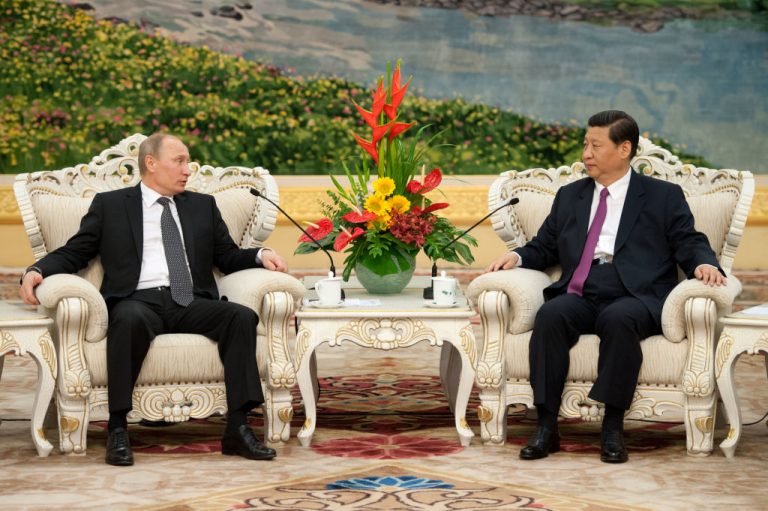As diplomatic pressure from the U.S. and other Western countries continue to mount, Chinese President Xi Jinping and his Russian counterpart Vladimir Putin are scheduled to hold a virtual meeting on Dec. 15.
The meeting, announced today by the Chinese Ministry of Foreign Affairs, will be the second discussion between the two leaders this year and has been called a “show of unity” by analysts. After being left out of the Biden administration’s democracy summit held earlier this month, Beijing and Moscow want to show they are aligned against Washington and foreign pressure.
Chinese foreign ministry spokesman Wang Wenbin did not reveal what was on the agenda for the two presidents to discuss, but said the details would be released after the meeting concludes.
“At the meeting, the two heads of state will give a full review of China-Russia relations and cooperation in various fields this year and make top-level designs for the development of bilateral ties next year,” Wang said in a daily press briefing.
The meeting also comes after a number of Western countries followed the U.S.’ lead in deciding to hold diplomatic boycotts of China’s upcoming Winter Olympics.
The Biden administration has justified the boycott by pointing to the severe human rights abuses committed by the Chinese Communist Party (CCP) against prisoners of conscience and vast numbers of Uyghur Muslims held in concentration camps across Western China.
Success
You are now signed up for our newsletter
Success
Check your email to complete sign up
The U.S. and other nations traditionally send high-level delegations to each Olympic games. For the Summer Olympics held in Tokyo this year, first lady Jill Biden embarked on her first international solo trip leading an American contingent, while second gentleman Doug Emhoff also led a delegation to the Paralympic Games in August.
READ MORE:
US Officially Announces Diplomatic Boycott of 2022 Beijing Winter Olympics
Canada and the UK Join American Diplomatic Boycott of the Beijing Winter Olympics
Putin has accepted Beijing’s invitation to visit the Games’ opening ceremony scheduled to be held in February of next year. The announcement makes him the first world leader to confirm he will attend the ceremony in person.
“The aim is to boost the significance of [the] in-person summit, so that both sides deliver not only a handshake, but a full-scale performance that demonstrates solid improvement of China-Russia ties on Xi’s and Putin’s watch,” Alexander Gabuev, senior fellow at the Carnegie Moscow Centre said.
Li Yonghui, a professor specializing in Russia and Central Asia at the University of the Chinese Academy of Social Sciences, said that the meeting had geopolitical significance and would show the West that the two countries share a lot of common ground.
“Both countries are due to produce a statement from the top leadership meeting that demonstrates the shared position on many international issues,” Li said.















